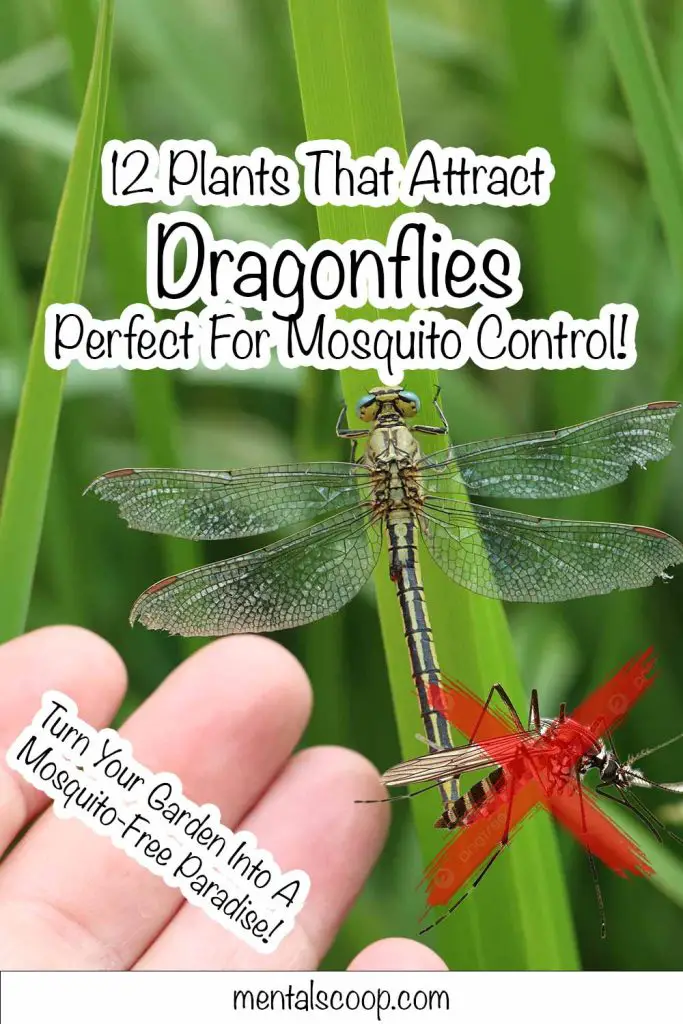12 Plants That Attract Dragonflies, Perfect For Mosquito Control!

Imagine sitting in your backyard on a warm summer evening, enjoying a peaceful sunset with friends and family. The gentle rustling of leaves and the distant chirping of birds create a tranquil ambiance. But as the evening sets in, something else makes its presence known—the buzz of mosquitoes.
Before you rush to grab chemical repellents or set up insect zappers, consider a natural and aesthetically pleasing alternative: attracting dragonflies to your garden. These graceful insects are not only captivating to watch, but they are also fierce mosquito predators.
In this blog article, we’ll explore 12 plants that attract dragonflies, providing you with a natural way to keep mosquitoes at bay.
The Dragonfly: Nature’s Mosquito Hunter
Dragonflies are often called the “hawks of the insect world,” and for good reason. A single dragonfly can consume hundreds of mosquitoes in a single day. They are agile fliers and voracious predators, making them an ideal addition to your garden for natural mosquito control.
To attract dragonflies, you need to create an environment that meets their habitat requirements. This includes water sources for breeding and specific plants that provide food and shelter. Let’s dive into the 12 plants that are known to attract these magnificent creatures.
1. Water Lilies (Nymphaea spp.)
Water lilies are stunning aquatic plants that add a touch of elegance to any garden pond. Dragonflies are attracted to the calm, sheltered waters that water lilies create. These plants provide a perfect spot for dragonfly nymphs to grow and thrive. Additionally, the vibrant blooms of water lilies will add color and beauty to your garden.
2. Arrowhead (Sagittaria latifolia)
Arrowhead, also known as “duck potato,” is a perennial aquatic plant with arrow-shaped leaves and white flowers. It grows in shallow waters, making it ideal for attracting dragonflies. The plant’s dense foliage provides cover for dragonfly nymphs, while the open water allows adult dragonflies to hunt for prey.
3. Pickerelweed (Pontederia cordata)
Pickerelweed is another attractive aquatic plant with vibrant purple-blue flowers. It thrives in ponds and marshy areas, providing a perfect environment for dragonflies. The tall, upright flower spikes of pickerelweed create excellent perches for adult dragonflies, allowing them to rest and survey their hunting grounds.
4. Swamp Milkweed (Asclepias incarnata)
Swamp milkweed is a stunning perennial plant that attracts a variety of pollinators, including dragonflies. Its clusters of pink flowers are not only beautiful but also provide a source of nectar for dragonflies and other beneficial insects. Swamp milkweed thrives in moist, marshy environments, making it ideal for garden ponds and wetland areas.
5. Cardinal Flower (Lobelia cardinalis)
Cardinal flower is a striking perennial plant known for its vibrant red blooms. It grows in wet soils and along streambanks, providing a suitable habitat for dragonflies. The plant’s tall flower spikes offer excellent perches for dragonflies, allowing them to rest and hunt for mosquitoes in the surrounding area.
6. Blue Flag Iris (Iris versicolor)
Blue flag iris is a native wetland plant with striking blue-violet flowers. It thrives in marshy areas and around pond edges, creating an ideal environment for dragonflies. The plant’s dense foliage offers cover for dragonfly nymphs, while the tall flower stalks serve as perches for adult dragonflies.
7. Sweet Flag (Acorus calamus)
Sweet flag is an aromatic perennial plant that grows in wet soils and shallow waters. Its dense foliage creates a sheltered environment for dragonfly nymphs, while the tall, reed-like stems provide perches for adult dragonflies. Sweet flag is an excellent addition to garden ponds and wetland areas.
8. Cattails (Typha spp.)
Cattails are iconic wetland plants that attract dragonflies with their dense foliage and abundant water sources. These tall, reed-like plants create a perfect habitat for dragonfly nymphs, allowing them to grow and develop in a protected environment. The tall cattail stalks also serve as ideal perches for adult dragonflies.
9. Lizard’s Tail (Saururus cernuus)
Lizard’s tail is a unique aquatic plant with long, curving flower spikes and heart-shaped leaves. It grows in shallow waters, making it an ideal choice for attracting dragonflies. The plant’s dense foliage provides cover for dragonfly nymphs, while the flower spikes offer perches for adult dragonflies.
10. Joe Pye Weed (Eutrochium purpureum)
Joe Pye weed is a tall perennial plant with clusters of pinkish-purple flowers. It thrives in moist soils and attracts a variety of pollinators, including dragonflies. The tall flower spikes serve as excellent perches for adult dragonflies, while the dense foliage provides cover for dragonfly nymphs.
11. Buttonbush (Cephalanthus occidentalis)
Buttonbush is a deciduous shrub with unique spherical flower clusters. It grows in wetlands and along streambanks, providing an ideal environment for dragonflies. The dense foliage and abundant water sources create a perfect habitat for dragonfly nymphs, while the flower clusters offer perches for adult dragonflies.
12. Goldenrod (Solidago spp.)
Goldenrod is a versatile perennial plant known for its bright yellow flower spikes. It attracts a variety of pollinators, including dragonflies. Goldenrod thrives in moist soils and adds a burst of color to your garden.
The tall flower spikes serve as perches for adult dragonflies, allowing them to hunt for mosquitoes in the surrounding area.
By incorporating these 12 plants into your garden, you can create an inviting habitat for dragonflies and reduce the mosquito population naturally. Whether you have a garden pond, wetland area, or simply moist soils, these plants will attract dragonflies and add beauty to your outdoor space.
Not only will you enjoy the captivating sight of dragonflies darting through the air, but you’ll also appreciate the natural mosquito control they provide. So, get started on creating a dragonfly-friendly garden and say goodbye to pesky mosquitoes!

More interesting articles you may be interested in reading:

